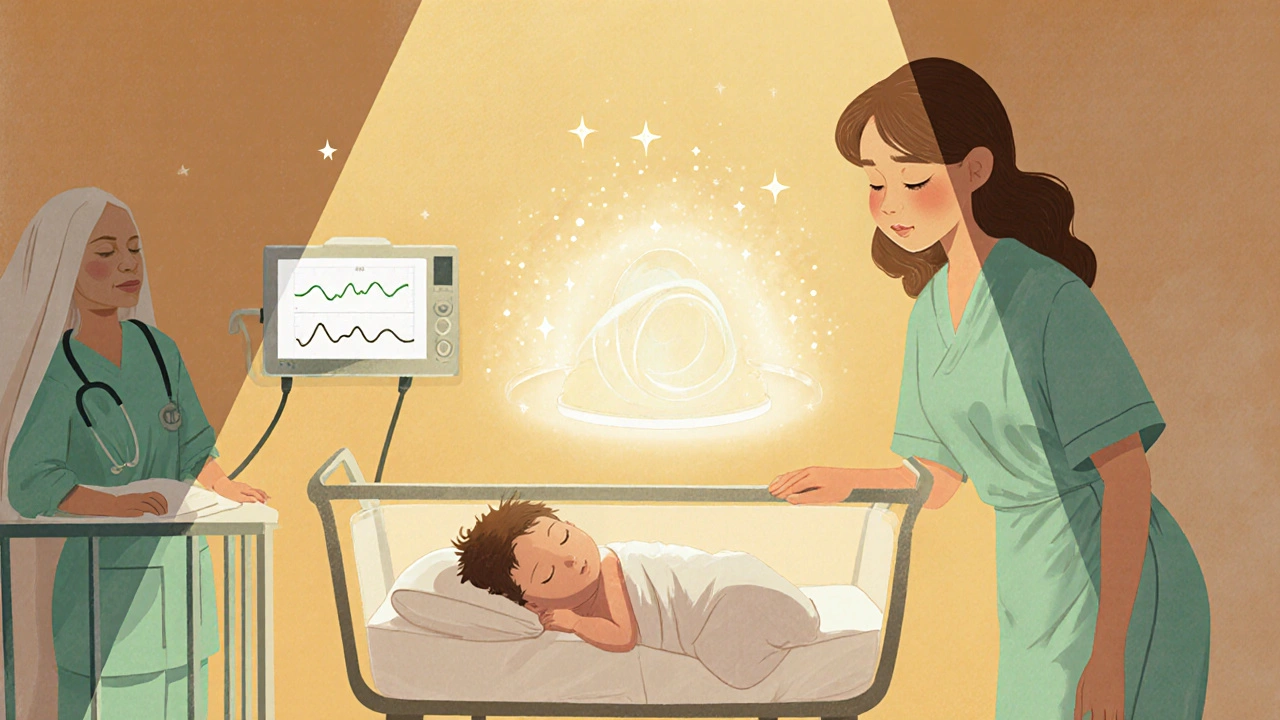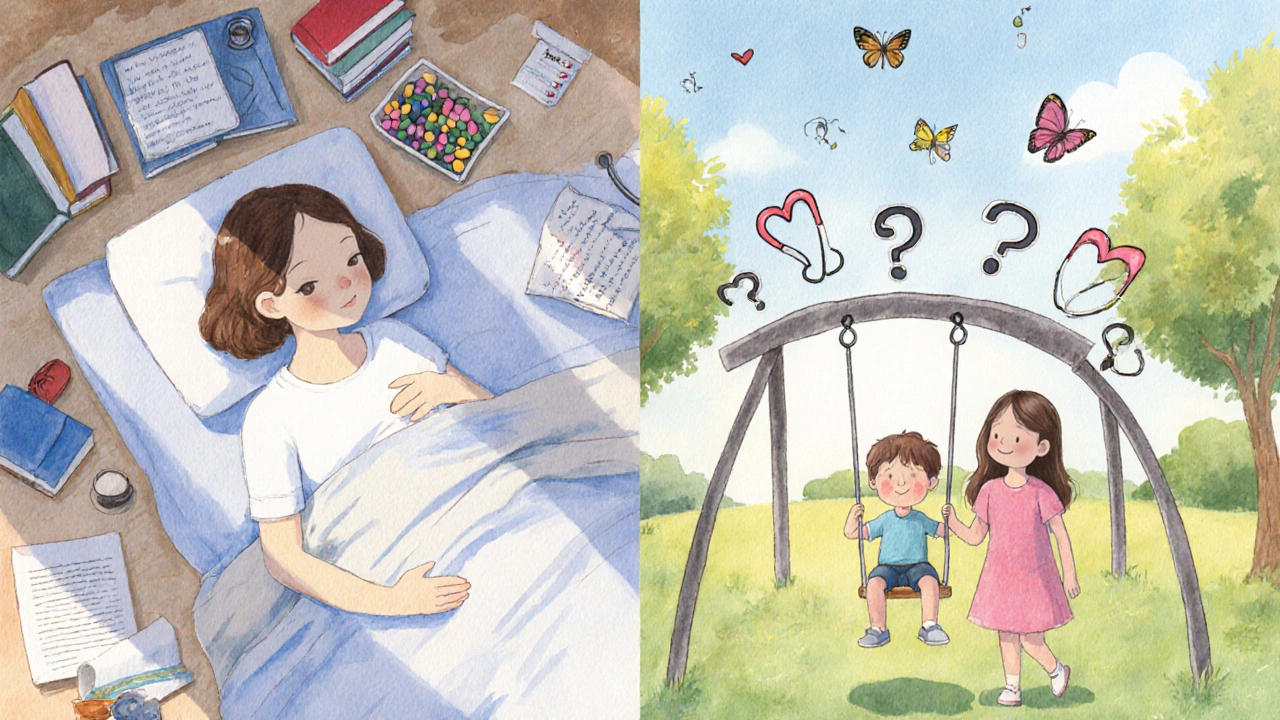When you're pregnant and managing a mental health condition like schizophrenia or bipolar disorder, the decision to keep taking olanzapine isn't simple. You're not just thinking about yourself anymore. You're weighing how a medication might affect your baby, while also knowing that untreated illness can be just as dangerous. This isn't a matter of choosing between good and bad-it’s about finding the safest path forward with real, current data.
What is olanzapine?
Olanzapine is an antipsychotic medication, sold under brand names like Zyprexa. It works by balancing chemicals in the brain, especially dopamine and serotonin. It’s commonly prescribed for schizophrenia, bipolar disorder, and sometimes severe depression when other treatments haven’t worked. For many people, it’s the only thing that keeps symptoms under control enough to function-hold a job, care for family, sleep through the night.
But when pregnancy happens, questions rush in. Is it safe? Will it cause birth defects? Will my baby be withdrawn or have trouble feeding? These aren’t hypothetical fears-they’re real concerns backed by decades of research.
Is olanzapine safe during pregnancy?
The short answer: olanzapine is not known to cause major birth defects, but it’s not risk-free. Large studies tracking over 1,500 pregnancies where mothers took olanzapine show no consistent pattern of physical malformations like heart defects or cleft palate. That’s reassuring. But safety isn’t just about structure-it’s about function.
One of the most documented concerns is neonatal withdrawal. Babies exposed to olanzapine late in pregnancy may show jitteriness, muscle stiffness, feeding difficulties, or excessive sleepiness in the first few days after birth. These symptoms usually fade within a week or two, but they require close monitoring in the hospital. One 2023 review from the MotherToBaby network found that about 1 in 5 infants exposed to olanzapine in the third trimester showed mild withdrawal signs. That’s not common, but it’s common enough to plan for.
Another risk is weight gain. Olanzapine can increase appetite and insulin resistance. During pregnancy, that can mean higher chances of gestational diabetes, high blood pressure, or having a baby larger than average (macrosomia). A 2024 study in the Journal of Clinical Psychiatry found that women on olanzapine during pregnancy were 2.3 times more likely to develop gestational diabetes than those not taking antipsychotics.
What about breastfeeding?
Olanzapine does pass into breast milk, but in very small amounts-usually less than 1% of the mother’s dose. Most babies exposed through breastfeeding show no side effects. The American Academy of Pediatrics considers olanzapine compatible with breastfeeding, especially if the mother was taking it before delivery and the baby is healthy.
Still, watch for signs like unusual sleepiness, poor feeding, or slow weight gain. If your baby seems unusually lethargic or isn’t latching well, talk to your pediatrician. Many mothers successfully breastfeed while on olanzapine, especially when they’re well-rested, well-supported, and monitored.
What are the risks of stopping olanzapine?
This is the most critical point: stopping olanzapine suddenly can be more dangerous than continuing it. Relapse rates for bipolar disorder or schizophrenia during pregnancy are high-up to 70% in women who discontinue antipsychotics. A relapse can mean hospitalization, loss of housing, inability to care for yourself or your baby, or even suicidal thoughts.
One 2022 study from the University of Toronto followed 187 pregnant women with bipolar disorder. Those who stopped their medication were four times more likely to experience a severe mood episode requiring emergency care. The risk wasn’t just to the mother-it affected prenatal care attendance, nutrition, and even the baby’s development due to stress hormones.
Stopping isn’t a choice between medication and safety. It’s a choice between two kinds of risk. For many, staying on olanzapine is the safer path.

What should you do if you’re pregnant or planning to be?
If you’re already on olanzapine and find out you’re pregnant, don’t panic. Don’t stop cold. Call your psychiatrist and OB-GYN right away. Together, you’ll review your dose, your symptoms, and your support system.
Here’s what a typical plan looks like:
- Keep taking your current dose unless your doctor says otherwise. Sudden changes can trigger relapse.
- Start prenatal vitamins with at least 800 mcg of folic acid. Folic acid reduces neural tube defect risk and may help offset some medication-related risks.
- Get screened for gestational diabetes early-often at 16-20 weeks instead of 24-28.
- Work with a high-risk pregnancy team if you have other conditions like obesity or diabetes.
- Plan for postpartum support. Hormonal shifts after birth can trigger relapse, even if you stayed stable during pregnancy.
If you’re planning pregnancy and on olanzapine, talk to your doctor at least 3-6 months ahead. This gives time to stabilize your condition, adjust your dose if needed, and ensure your mental health is solid before conception.
Are there safer alternatives?
Some antipsychotics have more pregnancy data than olanzapine. Quetiapine and risperidone are often considered first-line alternatives because they’ve been studied in more pregnancies. But “safer” doesn’t mean “better for you.”
Quetiapine might cause less weight gain but can lead to more sedation. Risperidone has a slightly higher risk of movement disorders in newborns. Olanzapine has the most data on long-term child development-studies tracking children up to age 7 show no major differences in IQ, language, or behavior compared to unexposed peers.
The best medication is the one that keeps you stable. Switching drugs during pregnancy can destabilize your mental health more than any side effect from olanzapine.
What does the long-term data say?
Children exposed to olanzapine in the womb have been followed into early childhood. A 2024 study in The Lancet Psychiatry followed 217 children exposed to olanzapine during pregnancy and compared them to 198 children of mothers with similar mental illness who didn’t take medication. There was no difference in cognitive scores, emotional development, or behavioral problems at age 5-7.
That’s powerful. It means the medication isn’t harming brain development. What matters more is whether the mother was able to care for her child-something olanzapine helps make possible.

What about fathers taking olanzapine?
There’s no evidence that olanzapine use by fathers affects sperm quality or increases birth defect risk. You don’t need to stop or change medication if your partner is taking it. Focus on the mother’s treatment plan.
How to talk to your doctor about this
Bring these questions to your next appointment:
- What are my options if I want to reduce my dose?
- Can we monitor my blood sugar and weight more closely?
- Who will be part of my care team-psychiatrist, OB, pediatrician?
- What signs should I watch for in my baby after birth?
- Can I meet with a lactation consultant who understands psychiatric medications?
Don’t let fear silence you. Your mental health is part of your baby’s health. A calm, supported mother is the best environment for a growing child.
Where to find support
Organizations like MotherToBaby (in the U.S. and Canada) offer free, confidential counseling with specialists in pregnancy and medication safety. You can call them anytime. In Canada, you can reach them at 1-877-327-2229. They don’t give medical advice-they help you understand the risks so you can make informed choices with your doctor.
Support groups for pregnant women on antipsychotics also exist. You’re not alone. Many mothers have walked this path and are now raising healthy children.
Can olanzapine cause miscarriage?
There is no strong evidence linking olanzapine to an increased risk of miscarriage. Studies involving over 1,500 pregnancies show miscarriage rates are similar to those in the general population and in women with mental illness who aren’t taking medication. The biggest risk to pregnancy comes from untreated illness-not from olanzapine itself.
Will my baby be born addicted to olanzapine?
No, babies aren’t addicted to olanzapine. But they can experience temporary withdrawal symptoms if exposed late in pregnancy. These include jitteriness, irritability, poor feeding, or sleepiness. These are not signs of addiction-they’re physiological responses to the sudden drop in medication after birth. They usually resolve within days and are managed with observation and supportive care.
Is it safe to take olanzapine in the first trimester?
Yes. Olanzapine doesn’t increase the risk of major birth defects when taken during the first trimester. The critical period for organ formation is over by week 10, and studies show no pattern of defects linked to olanzapine exposure at this stage. The priority is keeping your mental health stable, as stress and illness can affect fetal development more than the medication.
Can I switch to a different antipsychotic during pregnancy?
Switching medications during pregnancy is risky. It can trigger relapse, which is more dangerous than staying on a well-tolerated drug like olanzapine. If you’re stable on olanzapine, most experts recommend staying on it. If you’re having side effects, talk to your doctor about adjusting the dose-not switching drugs.
What if I can’t afford olanzapine?
Many pharmaceutical companies offer patient assistance programs for low-income individuals. In Canada, provincial drug plans often cover olanzapine for pregnant women with mental health conditions. Talk to your pharmacist or social worker-they can help you access free or low-cost medication. Your mental health is a medical necessity, not a luxury.
Final thoughts
You’re not choosing between being a good mother and taking medicine. You’re choosing how to be the healthiest version of yourself so you can care for your child. Olanzapine isn’t perfect-but for many, it’s the best tool they have to stay grounded, present, and alive during pregnancy. With careful monitoring and support, thousands of women have taken it safely and raised healthy, thriving children.
Your voice matters. Your needs matter. Don’t let stigma silence your questions. Ask for help. Get the care you deserve. You’re not alone in this.

Erin Corcoran
October 30, 2025 AT 08:55Just wanted to say THANK YOU for this post-it’s the kind of info I wish I’d had when I got pregnant on olanzapine. 😊 I was terrified at first, but my OB and psych team were amazing. My daughter is now 4 and hitting all her milestones-super verbal, playful, and zero developmental red flags. Also, folic acid is a GAME CHANGER. Took 1200 mcg daily and my glucose levels stayed stable. You’re not alone, mama. 💪
shivam mishra
October 30, 2025 AT 14:17As a psychiatrist in India who’s managed 12+ pregnant patients on olanzapine, let me add: the biggest risk isn’t the med-it’s the stigma. Families here often pressure women to ‘go off everything’ during pregnancy. Result? Relapse rates hit 80% in rural areas. Olanzapine’s placental transfer is low, and the data is solid. If the mom’s stable, don’t switch. Also, monitor weight and glucose every 4 weeks-not just at 28 weeks. Early screening saves lives. And yes, breastfeeding is fine-just watch for drowsiness in the first 72 hours.
Scott Dill
October 31, 2025 AT 02:47Bro. I just found out my wife is pregnant and she’s been on olanzapine for 5 years. I was about to panic and tell her to quit cold turkey. This post just saved us. No joke. I’m printing this out and bringing it to her psych appointment tomorrow. Also-how do we even find a lactation consultant who gets this stuff? Any tips? 🙏
Arrieta Larsen
October 31, 2025 AT 16:32My daughter was exposed to olanzapine in utero. She’s 6 now. Loves dinosaurs, hates broccoli, and sleeps through the night. I cried reading this because no one talked about the postpartum cliff. I was fine during pregnancy-then Day 3 after birth? Total collapse. Got back on my dose within 48 hours. If you’re planning this, prep your support system BEFORE delivery. Don’t wait until you’re in crisis.
Mike Gordon
November 2, 2025 AT 05:12So many people think meds = bad. But untreated psychosis = worse. The data says olanzapine doesn’t cause major defects. The fear is real. But the science is clearer. Also-fathers taking it? Zero risk. Stop blaming dads for things they can’t control. And yes, you can breastfeed. I’ve seen it work. Just watch the baby. Not the internet. Not your aunt. Your pediatrician.
Kathy Pilkinton
November 4, 2025 AT 04:09Oh wow. Another ‘trust your doctor’ post. Because we all just blindly follow doctors, right? 🙄 I had a doctor tell me ‘it’s fine’ and then my baby spent 72 hours in NICU with jittery tremors and couldn’t latch. No one warned me. No one said ‘this happens in 1 in 5 cases.’ So don’t just say ‘it’s safe.’ Say ‘here’s what to watch for’-and don’t sugarcoat it. Also-why is this post so long? Just tell me if I should stop or not. That’s all I need.
Holly Dorger
November 5, 2025 AT 17:35Hi I’m a mom who took olanzapine during both my pregnancies. My kids are 8 and 11 now. They’re both in honors classes and play soccer. I didn’t know any of this info back then. I just trusted my doc. And I’m so glad I did. The fear is real but the love is stronger. If you’re reading this and scared? You’re already a good mom. Just keep going. And if you need someone to talk to? DM me. I’ve been there. No judgment. Just coffee and real talk. ☕
Amanda Nicolson
November 7, 2025 AT 03:40Okay. I just finished reading this and I’m crying. Not because I’m scared-but because I finally feel seen. I’ve been on olanzapine since I was 19. I got pregnant at 31. I thought I’d have to choose between being a mom and being me. But this? This is the first time I’ve read something that didn’t treat me like a ticking time bomb. I’m 28 weeks now. My OB says my numbers are perfect. My therapist says I’m the most grounded I’ve ever been. And my baby kicks like a soccer player. I’m not just surviving-I’m thriving. And if you’re reading this and you’re scared? You’re not broken. You’re brave. And you’re going to be an incredible mother. I promise.
Jackson Olsen
November 7, 2025 AT 13:30Just one thing: if you’re worried about weight gain, walk 30 mins a day. Doesn’t have to be intense. Just move. And drink water. I did both. Gained 25 lbs total. Baby was 7 lbs 2 oz. No diabetes. No issues. You got this.